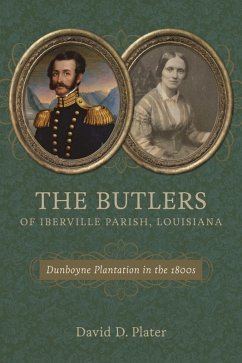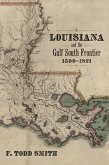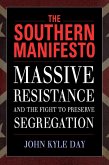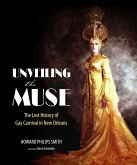In 1833, Edward G. W. and Frances Parke Butler moved to their newly constructed plantation house, Dunboyne, on the banks of the Mississippi River near the village of Bayou Goula. Their experiences at Dunboyne over the next forty years demonstrated the transformations that many land-owning southerners faced in the nineteenth century, from the evolution of agricultural practices and commerce, to the destruction wrought by the Civil War and the transition from slave to free labor, and finally to the social, political, and economic upheavals of Reconstruction. In this comprehensive biography of the Butlers, David D. Plater explores the remarkable lives of a Louisiana family during one of the most tumultuous periods in American history.
Born in Tennessee to a celebrated veteran of the American Revolution, Edward Butler pursued a military career under the mentorship of his guardian, Andrew Jackson, and, during a posting in Washington, D.C., met and married a grand-niece of George Washington, Frances Parke Lewis. In 1831, he resigned his commission and relocated Frances and their young son to Iberville Parish, where the couple began a sugar cane plantation. As their land holdings grew, they amassed more enslaved laborers and improved their social prominence in Louisiana's antebellum society.
A staunch opponent of abolition, Butler voted in favor of Louisiana's withdrawal from the Union at the state's Secession Convention. But his actions proved costly when the war cut off agricultural markets and all but destroyed the state's plantation economy, leaving the Butlers in financial ruin. In 1870, with their plantation and finances in disarray, the Butlers sold Dunboyne and resettled in Pass Christian, Mississippi, where they resided in a rental cottage with the financial support of Edward J. Gay, a wealthy Iberville planter and their daughter-in-law's father. After Frances died in 1875, Edward Butler moved in with his son's family in St. Louis, where he remained until his death in 1888. Based on voluminous primary source material, The Butlers of Iberville Parish, Louisiana offers an intimate picture of a wealthy nineteenth-century family and the turmoil they faced as a system based on the enslavement of others unraveled.
Born in Tennessee to a celebrated veteran of the American Revolution, Edward Butler pursued a military career under the mentorship of his guardian, Andrew Jackson, and, during a posting in Washington, D.C., met and married a grand-niece of George Washington, Frances Parke Lewis. In 1831, he resigned his commission and relocated Frances and their young son to Iberville Parish, where the couple began a sugar cane plantation. As their land holdings grew, they amassed more enslaved laborers and improved their social prominence in Louisiana's antebellum society.
A staunch opponent of abolition, Butler voted in favor of Louisiana's withdrawal from the Union at the state's Secession Convention. But his actions proved costly when the war cut off agricultural markets and all but destroyed the state's plantation economy, leaving the Butlers in financial ruin. In 1870, with their plantation and finances in disarray, the Butlers sold Dunboyne and resettled in Pass Christian, Mississippi, where they resided in a rental cottage with the financial support of Edward J. Gay, a wealthy Iberville planter and their daughter-in-law's father. After Frances died in 1875, Edward Butler moved in with his son's family in St. Louis, where he remained until his death in 1888. Based on voluminous primary source material, The Butlers of Iberville Parish, Louisiana offers an intimate picture of a wealthy nineteenth-century family and the turmoil they faced as a system based on the enslavement of others unraveled.
Dieser Download kann aus rechtlichen Gründen nur mit Rechnungsadresse in A, D ausgeliefert werden.









